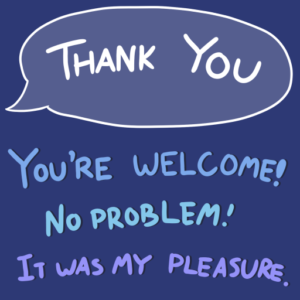You’re Welcome ~どういたしまして~
 When someone says thank you, you probably learned to reply, “you’re welcome.” There are many other ways to reply, too. For example, “no problem,” “any time,” “(it was) my pleasure,” or in Australia and New Zealand, “no worries.” Nowadays, younger people usually say “no problem” when someone says thank you. Conversely, they usually say “you’re welcome” when someone doesn’t thank them for something. On the other hand, many older people believe that “you’re welcome” is the correct reply to “thank you,” and some people get angry when younger people say “no problem” instead. Talk about a generation gap!
When someone says thank you, you probably learned to reply, “you’re welcome.” There are many other ways to reply, too. For example, “no problem,” “any time,” “(it was) my pleasure,” or in Australia and New Zealand, “no worries.” Nowadays, younger people usually say “no problem” when someone says thank you. Conversely, they usually say “you’re welcome” when someone doesn’t thank them for something. On the other hand, many older people believe that “you’re welcome” is the correct reply to “thank you,” and some people get angry when younger people say “no problem” instead. Talk about a generation gap!
語彙
probably – たぶん
reply – 返事する
nowadays – 最近、昨今
younger – 若めの
conversely – 逆に
on the other hand – 一方で、
older – 歳が上めの
believe – 信じる
correct – 正しい
instead – 代わりに
Talk about ~ ‐ 何という~!
generation gap – ジェネレーションギャップ
内容理解チェック!
この記事の内容に最も当てはまる物を以下の4つのうちから選んでください。
A) 若者はThank youに対してよくYou’re welcomeという
B) Thank youに対する間違った返し方がたくさんある
C) No problemという返し方は、間違っている
D) 若者がNo problemと言うことを、年上の人が怒ることがある
スキャニング!
- How can you reply to “Thank you?"
- When do younger people usually say “you’re welcome?"
- What do older people believe?
日本語では、ありがとうと言われたら、どんな返事をしますか?
コメントに英語で書いてみよう!





